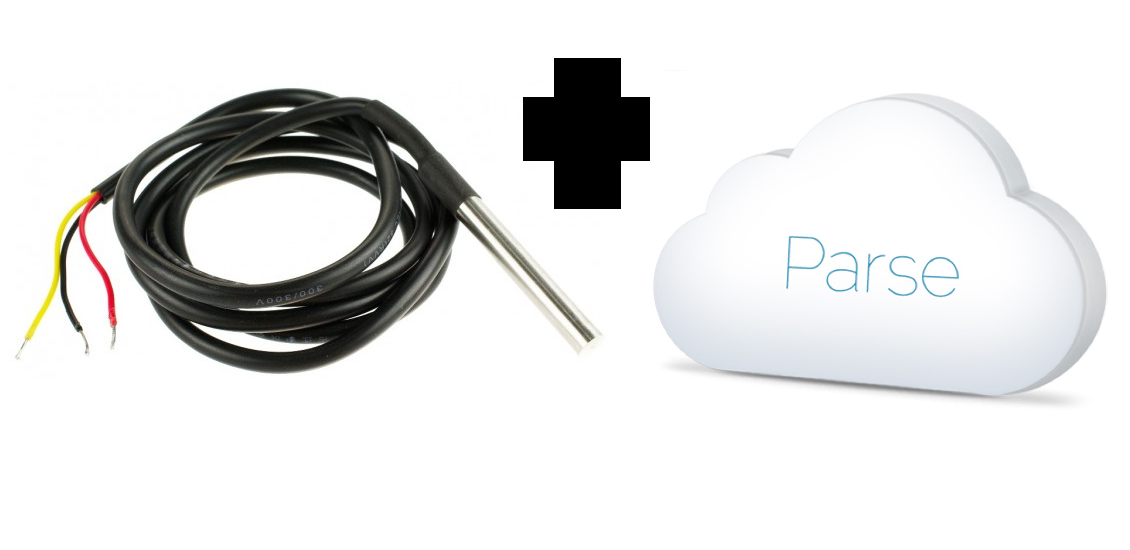As part of a future project I may be working on(details coming soon). I wanted to get some logging done with some temperature sensors to the online cloud database called Parse.com
If you want your data stored on the cloud to be able to access anywhere this is what you will need to do:
- Get a Parse.com Account, https://www.parse.com
- Setup an "App" and copy down the Application ID, and Rest API key
- Get the python library to work with parse objects:https://github.com/dgrtwo/ParsePy
- install the DS18b20 temperature probes
Parse App Setup
copy the application id and the rest api key to your python scriptGet the ParsePy library:
install on your pi using the command
git clone https://github.com/dgrtwo/ParsePy
cd ParsePy
sudo python setup.py install
Getting my Logging Library:
download here:
https://github.com/SimplyAutomationized/raspberrypi/raw/master/ParseTempLogging/ParseTemperature.py
usage:
from ParseTemperature import * logger = TempLogger(appkey='yourappkey',apikey='yourapikey') logger.start()#will create the class in your app and start appending temperature data to it whenever the temperature changes.
Now the two sensors started populating my online db.
from parse_rest.connection import register
from parse_rest.datatypes import Object
from threading import Thread
from time import sleep
import os
os.system('modprobe w1-gpio')
os.system('modprobe w1-therm')
class Temperature(Object):
pass
class TempLogger(Thread):
"""
A class for getting the current temp of a DS18B20
"""
def __init__(self, fileName='',debug=False,appkey='',apikey=''):
Thread.__init__(self)
register(appkey,apikey)#put your api key and app id here
self.debug = debug
self.probes = {}
self.tempDir = '/sys/bus/w1/devices/'
self.currentTemp = -999
self.correctionFactor = 1;
self.enabled = True
self.repopulateprobes()
def repopulateprobes(self):
list = os.listdir(self.tempDir)#here we create a dictionary with the probe id's
for item in list:
if(item[:2]=="28"):
if(self.debug):
print item
if(self.probes.has_key(item)==False):
self.probes[item]=0
def getTempForFile(self,file):
try:
f = open(self.tempDir + file + "/w1_slave", 'r')
except IOError as e:
print "Error: File " + self.tempDir + file + "/w1_slave" + " doesn't exist"
return;
lines=f.readlines()
crcLine=lines[0]
tempLine=lines[1]
result_list = tempLine.split("=")
temp = float(result_list[-1])/1000 # temp in Celcius
temp = temp + self.correctionFactor # correction factor
#if you want to convert to Celcius, comment this line
temp = (9.0/5.0)*temp + 32
if crcLine.find("NO") > -1:
temp = -999
if(self.debug):
print "Current: " + str(temp) + " " + str(file)
return float(int(temp*100))/100
def run(self):
while self.enabled:
for item in self.probes.items(): #we iterate through our probes we scanned for earlier and save temperatures to the dictionary
temp = self.getTempForFile(item[0])
if(item[1]!=temp):#if there is a change in the temperature we send it to parse
parseDBObject=Temperature()
parseDBObject.Probe=item[0]
parseDBObject.Temperature=temp
try:
parseDBObject.save()
except:
pass
self.probes[item[0]]=temp
def stop(self):
self.enabled=False
#returns the current temp for the probe
def getCurrentTemp(self,file):
return self.probes[file]








